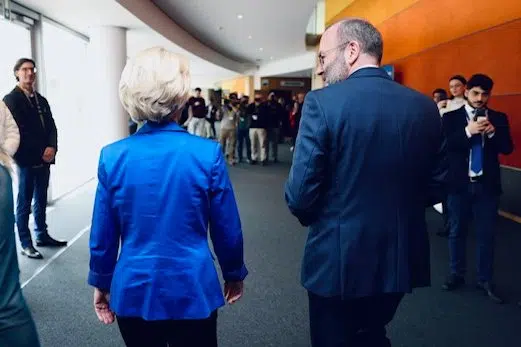Brussels – Ursula von der Leyen is the only lead candidate of the European People’s Party (EPP) for the Presidency of the next European Commission. The period for submitting internal EPP nominations has closed today (Feb. 21) at noon. After a closed-door meeting of the group in the European Parliament, President Manfred Weber announced “with pride” that the current president of the European Commission is the only lead name to represent the group in the June 6-9 elections.
Von der Leyen has already obtained formal support (needed for a green light) from two national parties that are members of the EPP, the Polish Platforma Obywatelska party of Donald Tusk and the Greek Nea Demokratia party of Premier Kyriakos Mītsotakīs. “We are proud to have Ursula von der Leyen as the only lead candidate for the June elections,” Weber said at an impromptu press conference outside the European Parliament chamber where the group met this morning.
Monday, the current leader of the Commission received the endorsement of her German party, the Christlich Demokratische Union (CDU), and declared her readiness to run for European elections as the spitzenkandidat (i.e., lead candidate) of the EPP having been formally nominated by the CDU and its president, Friedrich Merz. According to the internal rules, the nomination received will now be examined by the EPP Political Assembly on March 5 and, after validation, be put to a vote at the party congress in Bucharest on March 7, when the European Christian Democratic family will also adopt the political manifesto and nominate the lead candidate for the European elections. Greece and Poland but not only: von der Leyen’s name has also informally received the approval from Sweden’s prime minister, Ulf Kristersson, and Finland’s premier, Petteri Orpo, as well as Forza Italia. All members of the large Christian Democratic political family will most likely be reaffirmed as the largest group in the Strasbourg hemicycle. The support of the EPP – which will not be lacking in Bucharest – will not be enough in the European Parliament, where von der Leyen must receive an absolute majority (half of MPs plus one) from the European Parliament. In 2019, von der Leyen received the support of the so-called Ursula majority comprising the Populars, Social Democrats, and Liberals.
As for potential future alliances, von der Leyen set as ‘red lines’ Europeanism, being pro-NATO and pro-Kyiv. However, she does not rule out the entry into the EPP of new members who are more ‘moderate’ or supposedly so. “For me, it is important to work with pro-European, pro-NATO, pro-Ukrainian groups that are clear supporters of our democratic values,” she punctuated in response to a question about a potential alliance with the European Conservatives and Reformists (ECR) of which Giorgia Meloni’s Fratelli d’Italia is a member. She added that what will count in possible future alliances will be the content. “Those who are defending democracy against the Eurosceptics and those who are defending our values against Putin’s friends, these are the ones with which I want to work, and I know I can work with.” On the other hand, she said, “working with those who are against the rule of law is impossible, working with Putin’s friends is impossible.” The point, according to the president, is that it is now impossible to know the composition of the new Hemicycle. “We do not know who will form ECR after the elections, who will leave ECR, and, for example, might join the EPP, that is also possible.” But the red line remains democracy, values, support for Ukraine and detachment from Putin. “The answers must be very clear,” she concluded.
A second Von der Leyen term: defense and industry
Competitiveness, defense, and industry: in the brief press conference held alongside Weber at the European Parliament in Brussels, the German leader reiterated what had already been anticipated in recent days about how a possible second term should be structured, at the expense (probably) of the Green Deal commitments on which von der Leyen is now cautiously advancing because of criticism of her Green Deal for Europe.
Criticism from her group prompted von der Leyen to launch a ‘Green Deal 2.0’ phase that is more attentive to the business and agricultural fabric, those, in essence, most unhappy with this fast-paced transition. In recent months, von der Leyen launched a series of Transition Dialogues with Industry (the third will be tomorrow) and a Strategic Dialogue with Farmers that will serve to adjust the outgoing president’s tone so that she does not repeat the same mistakes in the next (eventual) term.
As the European Commission prepares to unveil a new defense strategy in early March, von der Leyen – who served as defense minister in the German government of Angela Merkel from 2013 to 2019 – confirmed today her interest in making the next legislature European defense-centric, with a new portfolio within the Commission, namely a commissioner for defense who would be responsible for the defense industry, related research and development, and “also preparing the EU from different shocks from outside,” von der Leyen said. A need that emerged after Russia’s war in Ukraine and the realization that the EU lacks a common defense. On this the EPP line is firm: “In the long run 330-340 million Americans will not defend over 400 million Europeans, so we have to take responsibility,” Weber stressed again.
English version by the Translation Service of Withub






